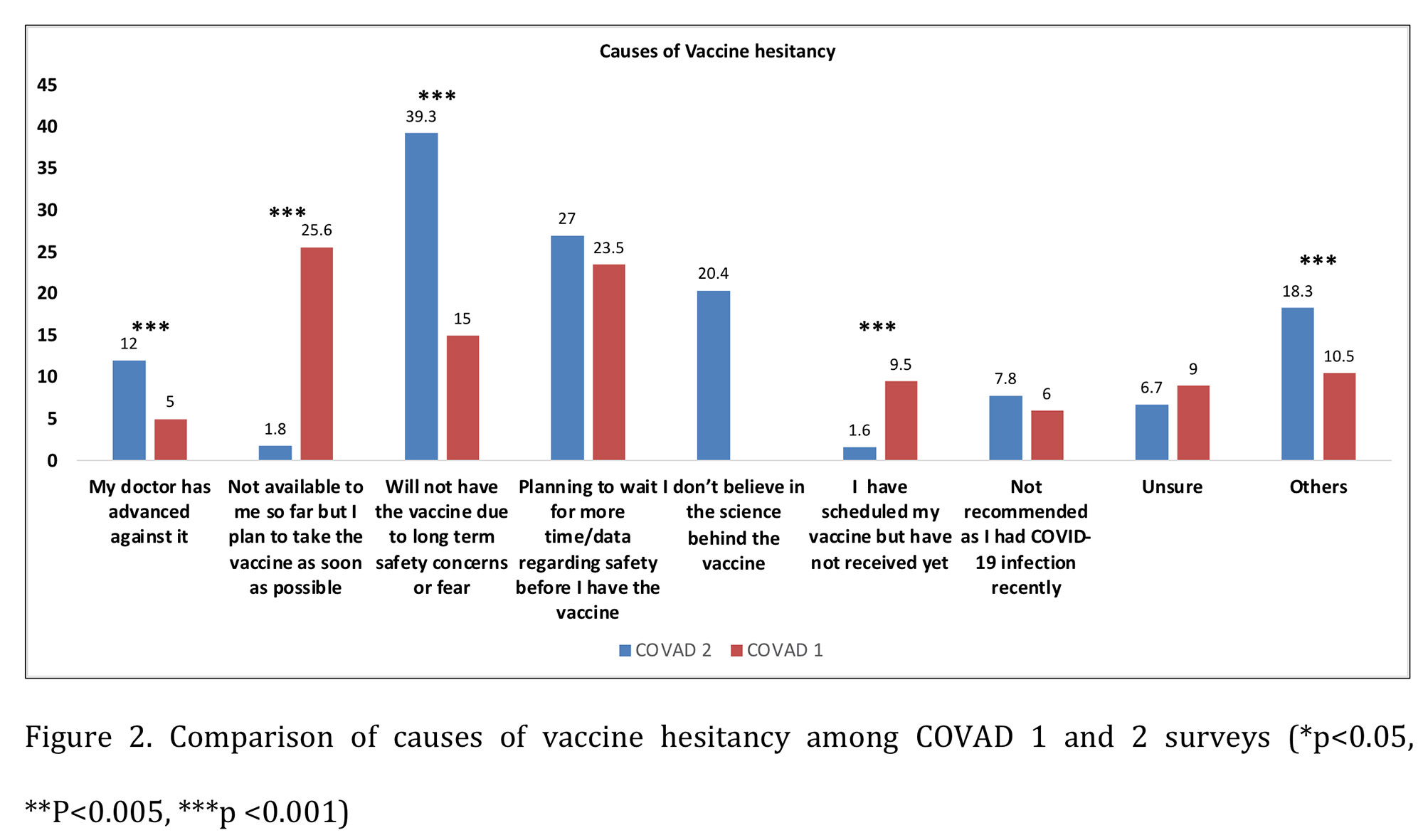Session Information
Session Type: Poster Session D
Session Time: 1:00PM-3:00PM
Background/Purpose: Patients with comorbidities and active rheumatic disease have increased morbidity and hospitalization following SARS-CoV-2 infection. While vaccination has decreased this, many unknown factors still influence COVID-19 vaccine hesitancy. The data on predictors of vaccine hesitancy is regional and scarce. We aimed to analyze the factors influencing vaccine hesitancy in 2022 and compare them with those in 2021 through multicentre international e-surveys (The COVID-19 Vaccination in Autoimmune Diseases Studies – COVAD study 1 and 2).
Methods: COVAD 1 and 2 are multi-centre international e-survey with 152 collaborators in 106 countries including patients with idiopathic inflammatory myopathies (IIM), autoimmune rheumatic diseases (AIRDs), other autoimmune diseases (AIDs), and healthy controls (HCs) conducted in March-December 2021 and February-June 2022 (ongoing), respectively. Descriptive and multivariable regression adjusting for age, gender, ethnicity, and stratified by country of residence was performed.
Results: Among the 18882 (2021) and 7666 complete responses (2022), and 3109 (16.5%) and 387 (5.1%) did not receive any COVID-19 vaccine, respectively. The prevalence of vaccine hesitancy has decreased [OR 0.26 (0.24-0.3), p< 0.001]. Among the 387 vaccine non-recipients in 2022, numbers were as follows: IIM 69 (17%), AIRDs 179 (46%), other AIDs 80 (20.6%), and HC 59 (15%). The reasons for vaccine hesitancy in 2022 included: doctor advising against it 47 (12%), don’t believe in the science behind the vaccine 79 (21%), long-term safety concerns 152 (39%), awaiting more safety data 105 (27%), and not recommended due to recent infection 30 (7%).
Compared to AIRDs and HCs, IIM patients were more disbelievers of the science behind the vaccine [OR 1.8 (1.08-3.2), p=0.023 AIRDs, OR 4 (1.9-8.1), p< 0.001 HC], had more long-term safety concerns [OR 1.9 (1.2-2.9), p=0.001 AIRDs, OR 5.4 (3-9.6), p< 0.001 HC] and had more doctors recommending against the vaccine [OR 12.9 (2.8-59), p< 0.001 HC] (Figure 1).
Vaccine non-recipients had higher pain visual analog score (VAS) (p< 0.001), lower fatigue VAS (p=0.003), lower PROMIS10a physical health (p< 0.001), and mental health scores (p=0.015) (Table 1).
The factors predicting vaccine hesitancy in regression were lower PROMIS10a global physical health score [OR 0.9 (0.8-0.97), p=0.014] and Caucasian ethnicity [OR 4.2 (1.7-10.3), p=0.001].
Compared to 2021, doctor’s advising against vaccination [OR 2.5 (1.8-3.6), p< 0.001] and long-term safety concerns [OR 3.6 (2.9-4.6), p< 0.001] were more frequent causes of vaccine hesitancy overall whereas vaccine non-availability [OR 0.05 (0.02-0.11), p< 0.001] and have scheduled the vaccination but not received [OR 0.1 (0.06-0.3), p< 0.001] were less frequent causes in 2022 (Figure 2).
Conclusion: Overall, the prevalence of COVID-19 vaccine hesitancy has decreased. Long-term safety concerns and the need for more safety data are now the major reasons for vaccine hesitancy. Caucasian ethnicity and lower physical health scores are predictors of vaccine hesitancy. The increase in physicians recommending against vaccination calls for more physician awareness to mitigate vaccine hesitancy.
To cite this abstract in AMA style:
R N, Joshi M, Sen P, Agarwal V, Shinjo S, Kardes S, Lilleker J, Chinoy H, Makol A, Distler O, Kim M, Nikiphorou E, Tan A, Salim B, Gheita T, Ziade N, Velikova T, Chatterjee T, Nune A, Milchert M, Parodis I, Gracia-Ramos A, O’Callaghan A, Saavedra Salinas M, Cavagna L, Kuwana M, Knitza J, Day J, Toro Gutiérrez C, Caballero C, Dey D, Zamora Tehozol E, Rojas Serrano J, Garcia-De La Torre I, Colunga I, Merayo-Chalico J, Pauling J, Wincup C, Gasparyan A, Agarwal V, Aggarwal R, Gupta L. Vaccine Hesitancy Among Patients with Idiopathic Inflammatory Myopathies and Rheumatic Diseases in 2021-2022: A Comparative Analysis of COVID-19 Vaccination in Autoimmune Diseases Surveys [abstract]. Arthritis Rheumatol. 2022; 74 (suppl 9). https://acrabstracts.org/abstract/vaccine-hesitancy-among-patients-with-idiopathic-inflammatory-myopathies-and-rheumatic-diseases-in-2021-2022-a-comparative-analysis-of-covid-19-vaccination-in-autoimmune-diseases-surveys/. Accessed .« Back to ACR Convergence 2022
ACR Meeting Abstracts - https://acrabstracts.org/abstract/vaccine-hesitancy-among-patients-with-idiopathic-inflammatory-myopathies-and-rheumatic-diseases-in-2021-2022-a-comparative-analysis-of-covid-19-vaccination-in-autoimmune-diseases-surveys/



